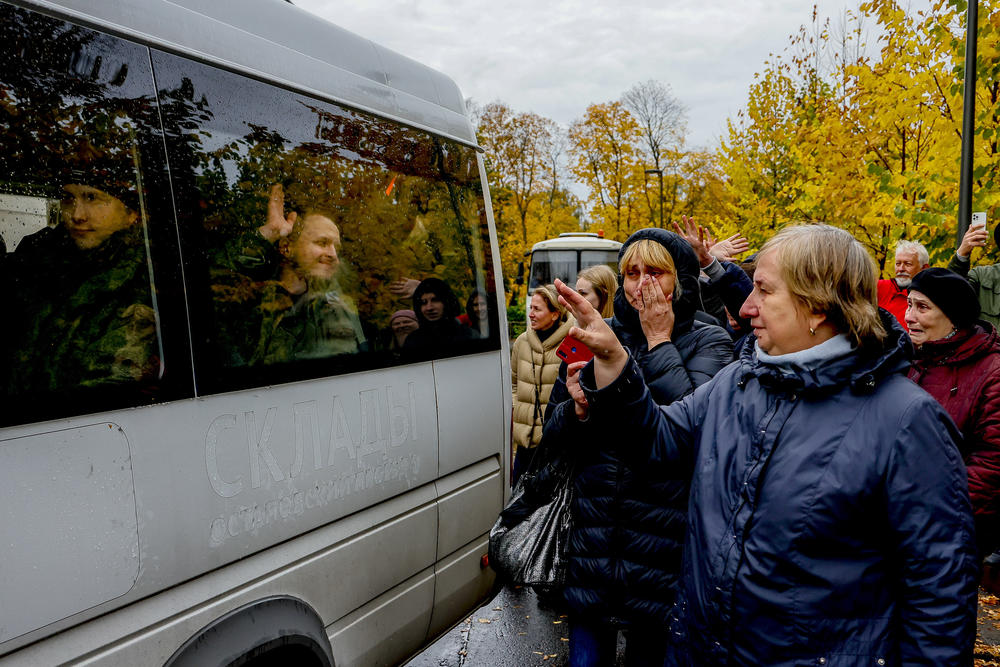Section Branding
Header Content
Russia races to pass tough new military draft rules, banning conscripts from leaving
Primary Content
MOSCOW — Russian President Vladimir Putin is expected to sign a new law that cracks down on draft dodging.
Lawmakers rushed the legislation through both houses of parliament this week.
It could have big implications for the Kremlin's war plans in Ukraine, especially as it tries to bolster Russian forces in anticipation of a Ukrainian counteroffensive.
Here are few key takeaways.
Draftees are banned from leaving the country
On a basic level, the new law makes it very difficult for Russians — mostly men but also women with specialized skills — to avoid being drafted or conscripted.
Until now, military recruitment officers have had to go in person to deliver a paper summons to a draftee's home or workplace.
That system will now be supplanted by electronic notifications — i.e. emails — issued through systems including the web portals that Russians use to pay their utility bills, taxes and other services.
The electronic notification will be binding from the moment the government hits send.
And with the new law, draftees are immediately banned from leaving the country.
Those who fail to show up at a recruitment office promptly will soon face a raft of new restrictions related to banking, selling property and even gaining access to a driver's license.
Already before the reform, people who refused orders to serve in the military have faced a possible prison sentence of up to 10 years.
The Kremlin learned from mobilization mishaps
Kremlin officials and lawmakers have made clear they see the law as a response to problems carrying out Putin's "partial mobilization" decree last fall to call up 300,000 troops to fight in Ukraine.
It provided reinforcements for the front line, but also drove hundreds of thousands of Russians to flee the country to avoid the draft. Many other citizens dodged service within the country by changing their address or simply claiming not to have seen the draft notice.
The new law's backers said it was time to close up loopholes that allowed some of the mishaps of last year's mobilization.
Provisions preventing draft dodgers from selling or transferring property, in particular, target Russians who fled abroad from cashing out.
The law isn't a new mobilization order, but the military seeks a boost
The Kremlin insists the new law in no way signals a "second wave" mobilization for Ukraine, but some experts are skeptical.
Whether the government calls up more Russians to fight ultimately depends on what happens in the coming months — particularly as Ukraine prepares to launch a counteroffensive to retake occupied territories.
In recent months, the military has focused on recruiting volunteers, offering contract soldiers far higher pay to fight in Ukraine — up to $2,600 a month, a vast sum for Russians from small towns or rural areas.
Authorities seem aware of how deeply unpopular last year's mobilization drive was. It set off protests across the country, and a rash of public complaints that recruits lacked equipment and training for battle — grievances that citizens often aired in public videos. President Putin even made a rare admission that "mistakes" were made.
Russia continues to struggle to meet its military objectives in Ukraine — suffering heavy losses and failing to control territory Moscow illegally claimed to have annexed last fall.
Amid those setbacks, the Defense Ministry in December said it planned to increase the size of the military by 30% to 1.5 million soldiers. That means adding several hundred thousand more troops to the current ranks on top of contract volunteers.
Copyright 2023 NPR. To see more, visit https://www.npr.org.


